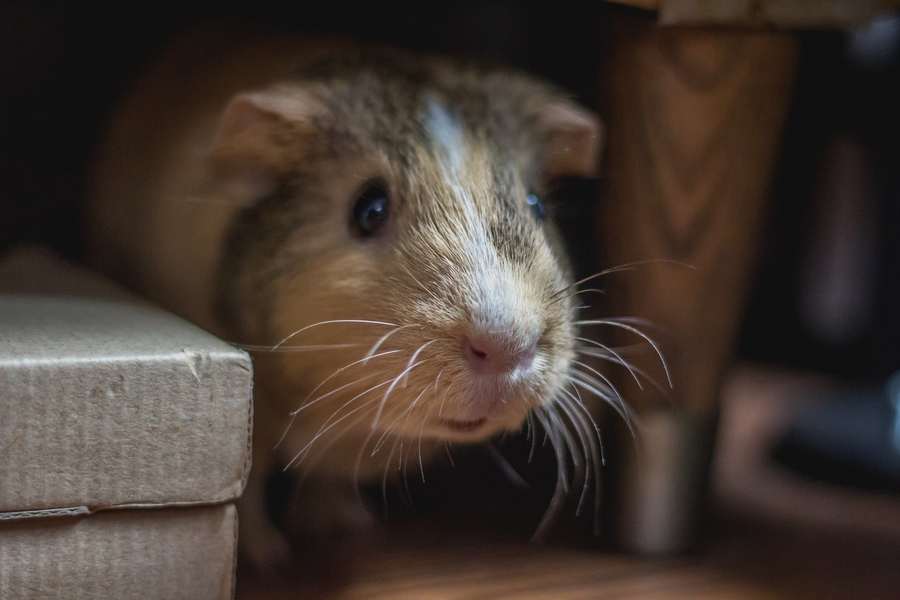Guinea pigs are adorable rodent that makes a truly unique pet. In fact, guinea pigs have been kept as pets throughout history. However, even in modern times, they are often misunderstood pets.
A common thought about these cute rodents is that they simply sit in their cages and aren’t very active. However, that couldn’t be further from the truth!
They tend to have big personalities and each piggie has its own tastes, likes and dislikes, favourite toys, etc.
Getting a baby guinea pig somewhere between 2 to 6 months is the best age to get a guinea pig. When you get a younger guinea pig, you’ll get the chance to watch them grow and be an active part of their lives! Guinea pigs are rodents and it is no secret that rodents age faster than other animals.
When thinking about getting a guinea pig as a pet, it is important to realize they need more than some would think. They need access to fresh hay, veggies, water, chew toys, proper bedding, and a decently sized cage just to name a few things.
While it seems like a lot, it truly is worth it to provide them with the very best! They are exciting, engaging, and absolutely wonderful pets to own. However, some people question what age a guinea pig they should get.
Regardless, they are fun-loving throughout all of their years of life!
There are special rescues with guinea pigs and they generally have a better idea of how old their piggies might be.
Guinea pigs that come from retail pet stores aren’t necessarily tracked properly so their ages could be a bit more of a mystery.
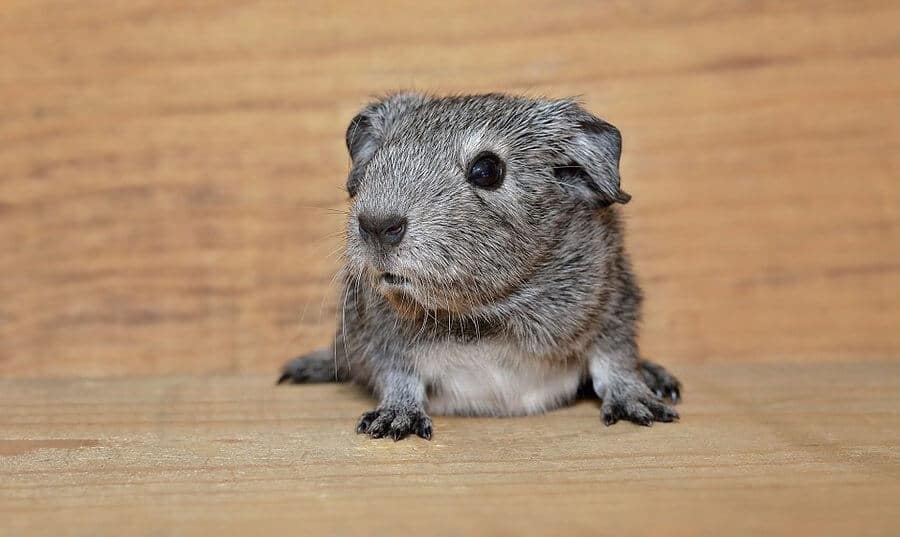
However, the age of a guinea pig can be gauged by a quick look at them.
Smaller guinea pigs that are found at retail pet stores or rescues are going to be baby guinea pigs. They will essentially fit in the palm of your hand or be slightly bigger than the palm of your hand.
It is a general rule that female guinea pigs are safe to leave their mothers at 4 weeks of age while male guinea pigs can leave their mothers at just 3 weeks of age.
This might seem entirely too young to leave their mother’s sides, however, because rodents age quickly, it should come as no real surprise.
Plus, younger guinea pigs are known to “popcorn”. Popcorning is where they get really excited about something and jump into the air.
Older piggies can do this too, however, younger piggies are known to do it more often. They are simply super adorable!
Older guinea pigs will obviously be a bit larger. Guinea pigs have an average weight of up to 2.6lbs (or 1.18kg) which doesn’t seem like that much but compared to other rodents, this is quite large!
There is nothing wrong with getting an older piggie. They do experience health issues as they get older, primarily with their joints and eyesight.
Older guinea pigs will usually be found within rescue facilities or sometimes pet stores if someone has dropped them off. No matter the age, guinea pigs are really special pets.
It is important to note that younger guinea pigs will be easier to bond with. Bonding with your guinea pig simply means building up trust with them.
They are prey animals, so some of them are shy. They prefer quieter surroundings and will bond with their owners through the patience of the owner.
Every guinea pig is different but the general rule of thumb is to give the piggie their space and not force them to be picked up or held until they are ready.
But what are some tips for bonding with your new piggie? Below are tips for bonding with a new guinea pig!
Tips For Bonding With Your New Guinea Pig
Establish A Common Floor Time Area
Guinea pigs should have a common area where they spend floor time outside of their cage. Setting up fleece or soft blankets in this space is important so that they feel safe and protected.
If there are other animals in the house, it might be wise to put up a small wired playpen that is meant for small animals to keep them contained and protected from other animals.
During their floor time, let them explore the area you’ve set up. Give them treats and chew toys and even a hiding hut to encourage them to explore and get comfortable!
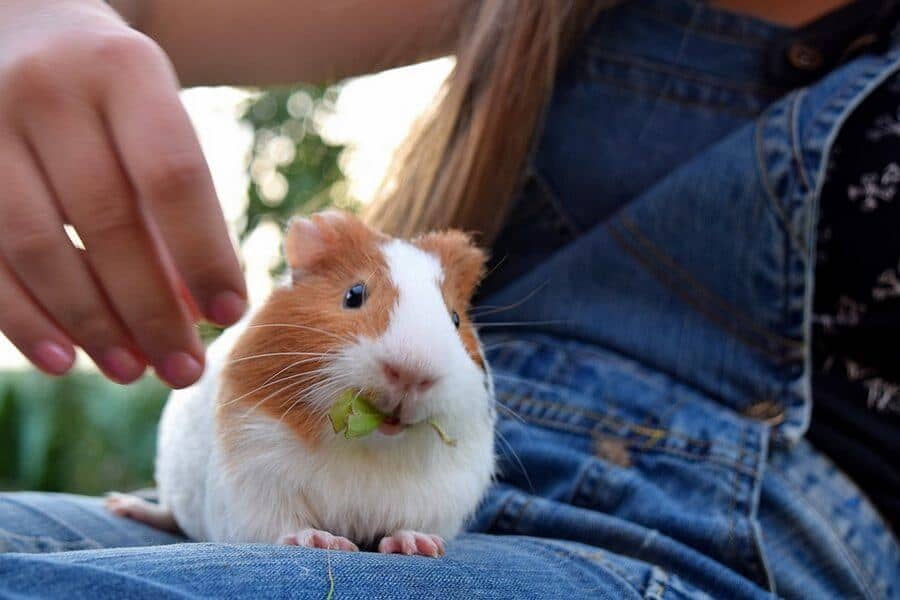
Always Talk Softly To Guinea Pigs
Talking in a soft voice to a guinea pig will help them learn your tone of voice.
It also helps keep them calm as they generally do not like any loud noises.
The more that they recognise your voice, the more they will feel comfortable around you! Do this any time you enter a room and especially doing floor time in their common area.
Guinea Pigs Love Rewards As Treats
Always offer them a treat. It could be a fresh veggie or a special treat made especially for guinea pigs. The best way to offer them a treat is to hold it by your fingertips, extended out towards the guinea pig.
Let them come to you. If they don’t at first, it is okay. They will eventually! This exercise helps build trust. If they aren’t taking it at first, just keep trying.
If they are taking it, that’s great but don’t stop offering them treats as it continues their bridge of trust with you.
Lay Down With Your Guinea Pig
Sometimes humans can be scary for guinea pigs as we are towering masses above them. If they are a little skittish, try laying on the blanket or fleece liner with them so you are at their level a little more.
During this time, talk to them and offer them treats. All of these tips combined make for a better session of bonding with your new guinea pig!
Bonding with a new guinea pig is important as it helps them gain trust in unfamiliar surroundings.
The younger piggies are easier to do this with, however, that isn’t to say that older piggies can’t be bonded with! In fact, these same tips can be applied to older guinea pigs.
Guinea pigs might be prey animals but they all generally have a docile demeanour about them. Bonding with your piggie will ensure that they trust you and leads to quality time with them as well!
Is 3 Old For A Guinea Pig?
Guinea pigs, like other rodents, age pretty quickly. Their bodies tend to slow down just as a human would as they get older, but at a much faster rate.
There is some debate out there about when a guinea pig is considered to be “old”. Guinea pigs have a life expectancy of 5 to 7 years. While that doesn’t necessarily seem very old, it is pretty old in guinea pig years!
When a guinea pig reaches 3 years of age, it can be considered an older guinea pig. Guinea pigs that range from 3 years to 5 years can start to show signs of aging.
It is important to recognise the signs of aging and that they aren’t necessarily signs of a guinea pig that is near the end of its life. Rather, they are signs that every piggie experiences as they become older.
Signs Of An Aging Guinea Pig
Your Guinea Pig Might Sleep More
As a guinea pig ages, it will sleep more. You will notice that they will sleep in their favourite spots a little more often. They do tend to slow down and sometimes because a little less active than they normally were.
However, every piggie is different and pigs of all ages can still be very active and full of spunk.
If you notice your older piggie sleeping a little more, always check that they are eating just fine and that they appear to be relieving themselves normally.
Their feces should still be pellet shaped and they should be drinking water. Moreover, try to engage with them during floor time to help get them moving a little more!
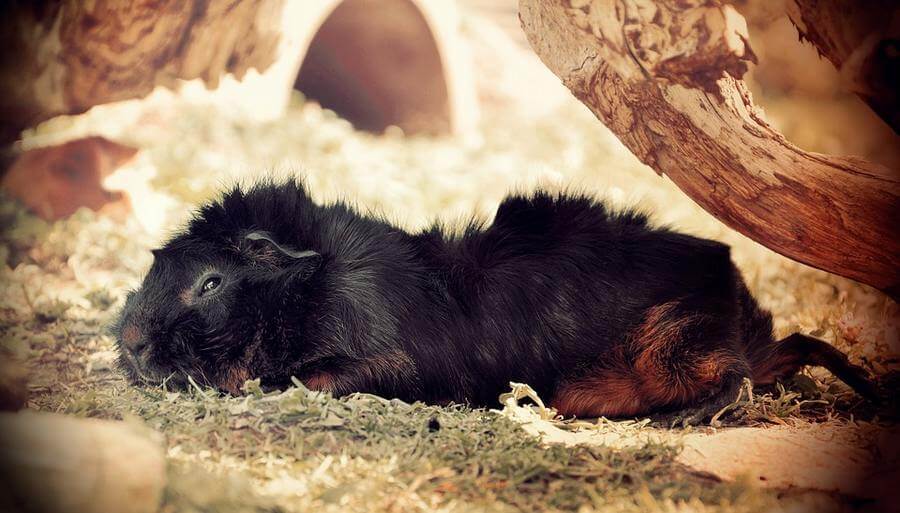
As Guinea Pigs Age There Nails Get Thicker And Crooked
No matter what a guinea pig’s age is, its nails are always growing! However, as they get older, their nails start to get a lot thicker and will start to curl under quicker.
It is important to trim their nails about once a month to keep them from curling completely under.
Some guinea pig owners are not comfortable doing this as some guinea pigs do have black nails making it nearly impossible to see the vein that runs in their nails.
For these piggies, a trip to an exotic vet is important so they can clip their nails regularly!
Older Guinea Pigs Can Suffer Muscle Loss
Older piggies tend to lose a little muscle as they age. This is normal and can cause them to lose a little bit of weight. As a result, you might notice an older guinea pig will have droopy lips, bony backs, or sagging necks.
While this is a normal occurrence in older piggies, it is important to check for drastic weight loss. This could indicate a bigger problem.
It is important to weigh guinea pigs once a week, on a kitchen scale, to ensure that they are staying around the 2.6lbs (or 1.18kg) weight.
If the weight doesn’t seem right, they should be taken to an exotic vet.
Muscle loss can also result in tooth problems due to loss of muscle loss around the jaw area. An exotic vet will check all parts of an aging piggie to make sure that they aren’t experiencing any issues due to muscle loss.
Muscle loss around the jaw can cause an older piggie to stop eating veggies or hay and is usually an indication that the back molars are having some issues.
Depending on the severity of the issue, they might require some dental work or teeth filing.
Ageing Guinea Pigs Develop Cataracts In The Eyes
Cataracts in a guinea pig’s eyes are a normal thing that happens as a guinea pig ages. Some piggies will develop these early on while others won’t develop them until after 3 years of age.
Basically, their eyes get cloudy little spots in them. The vet will notice them better than you will. These cataracts aren’t a huge concern but can worsen as they age.
The primary reason behind why they get cataracts is usually hereditary, especially in Abyssinian guinea pigs. However, conditions like diabetes can cause them as well.
It is important to also watch for increased thirst or other changes in normal activity to ensure that they are looked over by the vet.
While there are some noticeable changes in aging piggies, they can still lead happy, healthy lives!
Providing them with hay, fresh veggies, their daily vitamin c, and giving them daily exercise are great ways to ensure that they live as long as possible!
How Old Is 4 In Guinea Pig Years?
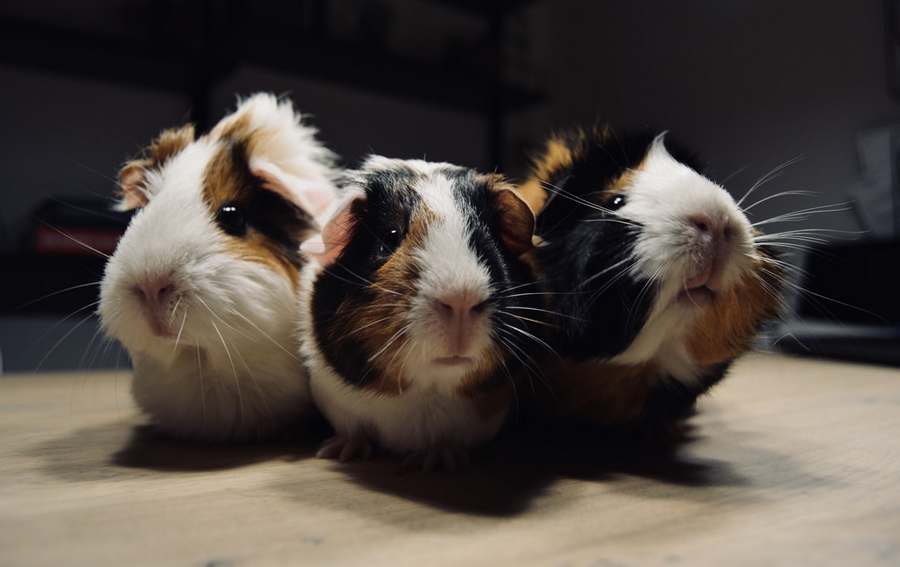
It is always interesting to see old animals in human years. This thought process is usually applied to dogs, however, it can be applied to other animals like guinea pigs.
Basically when someone thinks about “how many years is an animal in human years”, it applies to their age in comparison to a human.
Because animals have a different metabolism than humans, their animal years usually reflect a much older age than human years.
This is particularly true for rodents since they age a bit faster than other animals.
When thinking about guinea pigs, there is a general chart comparison of guinea pig years to human years.
A 4-year-old guinea pig is very close to 40 years in human years. Basically, 1 year is roughly 10 years of a human. Below is a more distinct look into what different ages of guinea pigs are compared to a human.
Guinea Pig Ages VS. Human Ages
| Guinea Pig Years | Human Years |
| 3 months | 2.5 years |
| 6 months | 5 years |
| 1 year | 10 years |
| 2 years | 20 years |
| 3 years | 30 years |
| 4 years | 40 years |
| 5 years | 50 years |
| 6 years | 60 years |
| 7 years | 70 years |
As you can see, a guinea pig basically adds an additional 10 years of human years each year of its life. Once it reaches 7 years of age or older, the years appear to double in human years.
A young guinea pig is considered to be anywhere from their birth to 6-months, an adult is considered to be between 6 months to 5 years, and any guinea pig over 5 years of age is considered a senior guinea pig.
What Is The Longest A Guinea Pig Has Lived?
The oldest guinea pig to ever live was said to be around 14 years old. The guinea pig’s name was Snowball and it passed away in 1979. This particular guinea pig is recognised by the Guinness World Records as the older guinea pig to ever live.
That is an incredible amount of time to live for a piggie! In fact, considering that a guinea pig’s life expectancy is only up to 7 years, Snowball lived to be about double that!
While it has been a long time since another piggie was recorded as living that long, guinea pigs can live full lives if they are properly taken care of!
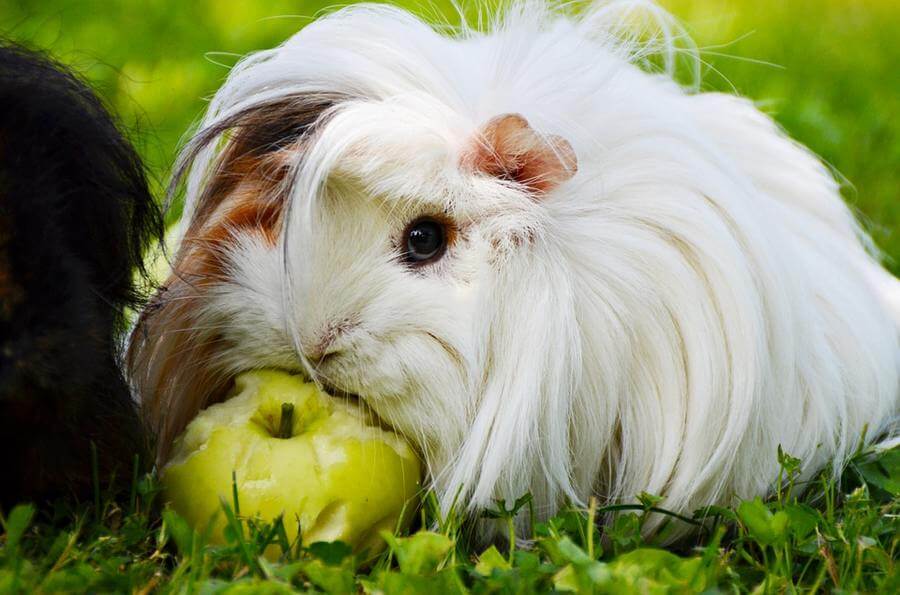
The biggest thing that guinea pigs need is access to hay to help grind their ever-growing teeth, fresh veggies (twice daily!), and vitamin c. Guinea pigs cannot synthesize their own vitamin c.
Vitamin c is necessary to create collagen in the body. If piggies do not receive enough vitamin c in their diets, they could have problems with the formation of bones, blood vessel issues, etc.
Administering vitamin c is done in two ways. It is either done by special compressed hay tablets that have vitamin c in them or by liquid vitamin c that is given through a plastic stopper syringe.
Most piggies do not like the syringe method, so trying the special hay tablets is usually the best route.
Giving a guinea pig vitamin c daily will ensure that their bodies are getting what it needs as well as help prolong their life as long as possible!
How Long Does It Take For A Guinea Pig To Reach Full-Size?
Guinea pigs are usually considered “adults” after 6 months of age and up to 5 years of age. A guinea pig rapidly grows between birth and the 6-month mark. After 6-months, they generally fill out and do not grow any larger. They can get fatter, but their skeletal development is usually completed after 6 months and onwards.
The average size of a guinea pig is around 8 to 9.8in (or 20-25cm) in length. From there, they can gain weight to become bigger.
Should You Get A Young Guinea Pig To Put With An Older Guinea Pig?
Guinea pigs should be kept in groups of two or more since they are sociable. Neutered males and females are the best pairings and generally get along the very best.
Females can be kept with females as well as males with males, however, it is important to check that they are getting along well.
There are normal behaviours that occur between guinea pigs such as mounting to show dominance, nipping, chasing, etc.
The important thing is to let the piggies sort it out unless it appears to get too violent. Then, they should be kept separate.
When it comes to getting two pigs, ideally, they should be similar in age and already bonded together. Bonded means that they are friendly towards each other and already are familiar with each other’s company.
However, some people might only start with one piggie or have one they may have fostered from a rescue.
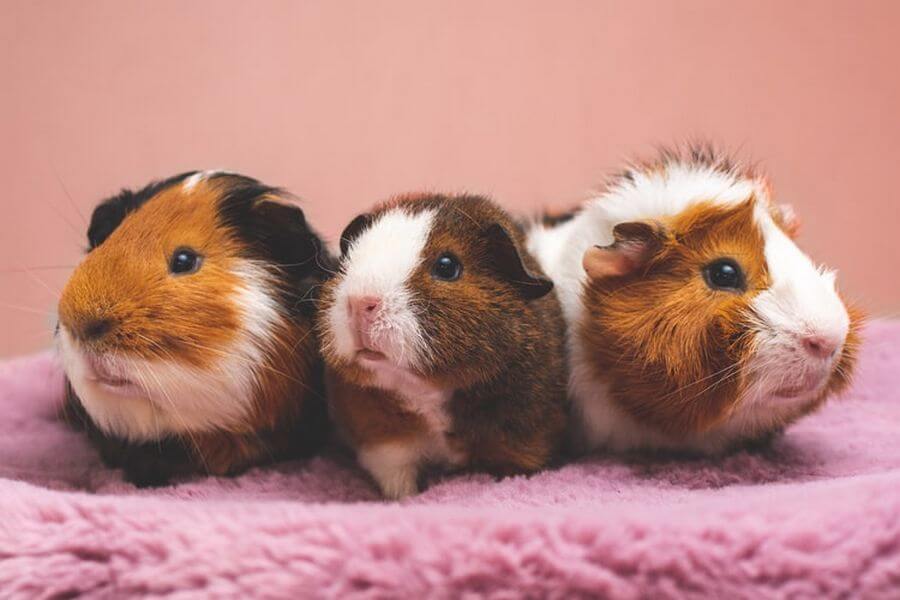
In this case, the question of “should you mix a younger and older piggie together?”. The answer is yes! The age difference will showcase that neither are a threat to the other. Issues can arise when two older piggies are placed together that aren’t bonded, especially with male guinea pigs.
They could see each other as a threat and might fight a lot. In this case, they may need to be separated. If they are bought or adopted together at a young age, they have a chance to bond and could end up getting along well.
All guinea pigs are different and their personalities do differ, so it really is a game of chance to see how well they will get along!
The important thing is to introduce them in a neutral space first, before caging them together and keeping a watchful eye on them to ensure nothing serious happens.
This might need to be done more than once, but generally, you will notice if they are accepting of each other within 15 to 30 minutes.
Getting a guinea pig is a super exciting event! Having a younger guinea pig is ideal, however, no matter what these adorable rodents are such lovable pets to have around!
Not only are they adorable but they have such big personalities that make them fun to engage with and watch as they get older!
More Pages On House Pets
Guinea pigs are one of the world's most unique and adorable rodent pets. These creatures have such large personalities and are often misunderstood. Having a guinea pig as a pet comes with...
Getting a guinea pig for a pet is such an exciting experience! These adorable rodents are quirky pets that are really fun to engage with. Guinea pigs have a reputation of being boring, however, this...


